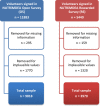HRQoL and nutritional well-being dissimilarities between two different online collection methods: Value for digital health implementation
- PMID: 36457811
- PMCID: PMC9706066
- DOI: 10.1177/20552076221138316
HRQoL and nutritional well-being dissimilarities between two different online collection methods: Value for digital health implementation
Abstract
Background: Online health data collection has gained a reputation over the last years to record and process information about health issues for implementing digital health.
Objective: The research aim was to appraise two online methods (open and rewarded) to collect information about HRQoL and nutritional well-being and to compare the results between both surveyed populations.
Methods: This cross-sectional study is framed on the NUTRiMDEA project. Online data through two different web-based methods (open survey and rewarded survey) were retrieved to assemble data related to sociodemographic, lifestyle (diet, physical activity and sleep patterns) and general health aspects, as well as HRQoL by an evidence-based form such as the SF-12 questionnaire, the IPAQ survey, and MEDAS-14, participants were adults (>18 years old).
Results: Overall, 17,332 participants responded to the open survey (OS, n = 11,883) or the rewarded survey (RS, n = 5449). About 65.1% of the participants were female, while the mean age was in the range of 40-70 years. There were significant differences (p < 0.05) between surveyed populations in sociodemographic, lifestyle (diet and physical activity), health and HRQoL data.
Conclusions: This investigation implemented an evidence-based online questionnaire that collected demographic, lifestyle factors, phenotypic and health-related aspects as well as compared differential outcomes in HRQoL and nutritional/lifestyle well-being depending on the online mode data collection. Findings demonstrated dissimilarities in most aspects of health, HRQoL, dietary intake and physical activity records between both populations. Overall, OS sample was characterized as a healthier population with superior lifestyle habits than RS participants.
Keywords: Online data collection; digital health; eHealth; health-related quality of life; nutritional well-being; web-based health.
© The Author(s) 2022.
Conflict of interest statement
The author(s) declared no potential conflicts of interest with respect to the research, authorship, and/or publication of this article.
Figures



References
-
- Graham H, White PC. Social determinants and lifestyles: integrating environmental and public health perspectives. Public Health 2016; 141: 270–278. - PubMed
-
- Karimi M, Brazier J. Health, health-related quality of life, and quality of life: what is the difference? Pharmacoeconomics 2016; 34: 645–649. - PubMed
-
- The world health organization quality of life assessment (WHOQOL): position paper from the world health organization. Soc Sci Med 1995; 41: 1403–1409. - PubMed
LinkOut - more resources
Full Text Sources

